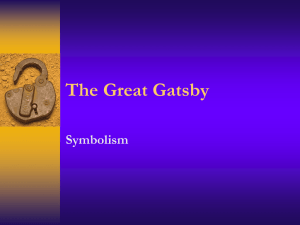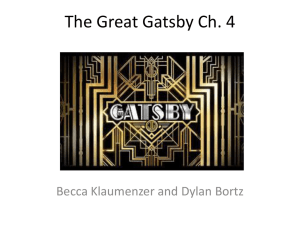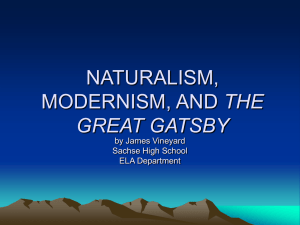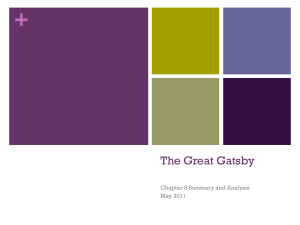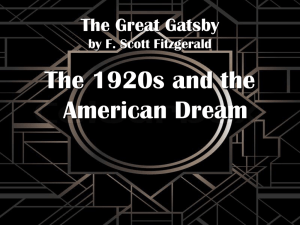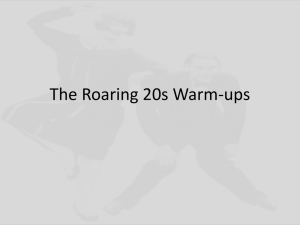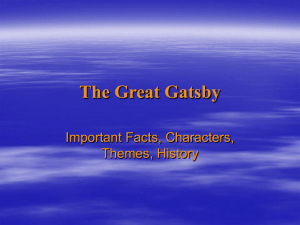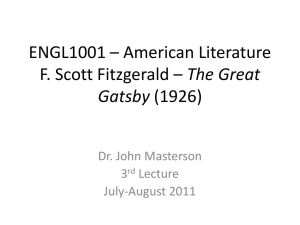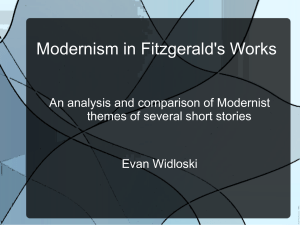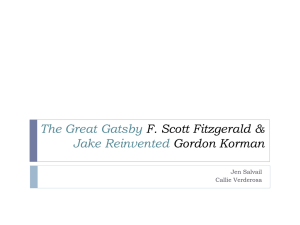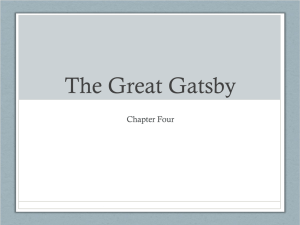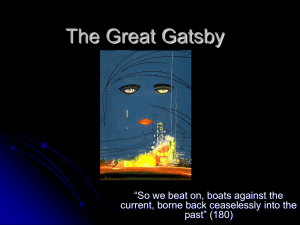Gatsby and Corelli
advertisement
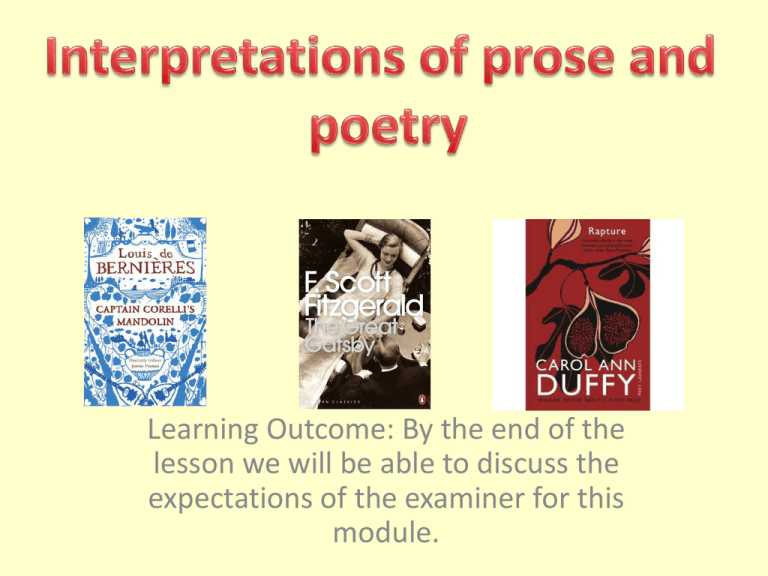
Learning Outcome: By the end of the lesson we will be able to discuss the expectations of the examiner for this module. • You will complete an exam that lasts for 2 hours and 45 minutes. • The exam is made up of two sections: Section A: Unseen section Section B: Analytical essay on set texts • This section is worth 40 marks. • You should spend about an hour on this section. • You will be expected to select either a piece of prose or a piece of poetry that you haven’t seen before and respond to it. • You will be expected to explore how the writer uses language, structure and form to create their meaning. • This section is worth 60 marks. • You will select a question to answer based on the texts that you have studied: ‘Captain Corelli’s Mandolin’, ‘The Great Gatsby’ and ‘Rapture’. • The question will be a comment made by a reader. You will have to respond to that comment referencing at least two of the three books that you have studied. • The question will be based on relationships. Dr Iannis had enjoyed a satisfactory day in which none of his patients had died or got any worse. He had attended a surprisingly easy calving, lanced one abscess, extracted a molar, dosed one lady of easy virtue with Salvarsan, performed an unpleasant but spectacularly fruitful enema, and had produced a miracle by a feat of medical prestidigitation. He chuckled to himself, for no doubt this miracle was already being touted as worthy of St Gerasimos himself. He had gone to old man Stamatis' house, having been summoned to deal with an earache, and had found himself gazing down into an aural orifice more dank, be-lichened, and stalagmitic even than the Drogarati cave. In my younger and more vulnerable years my father gave me some advice that I’ve been turning over in my mind ever since. “Whenever you feel like criticizing any one,” he told me, “just remember that all the people in this world haven’t had the advantages that you’ve had.” He didn’t say any more, but we’ve always been unusually communicative in a reserved way, and I understood that he meant a great deal more than that. In consequence, I’m inclined to reserve all judgments, a habit that has opened up many curious natures to me and also made me the victim of not a few veteran bores. The abnormal mind is quick to detect and attach itself to this quality when it appears in a normal person, and so it came about that in college I was unjustly accused of being a politician, because I was privy to the secret griefs of wild, unknown men. Most of theconfidences were unsought — frequently I have feigned sleep, preoccupation, or a hostile levity when I realized by some unmistakable sign that an intimate revelation was quivering on the horizon; for the intimate revelations of young men, or at least the terms in which they express them, are usually plagiaristic and marred by obvious suppressions. • In what ways are the two texts similar? • In what ways are the two texts different? • Which in your opinion is the most engaging opening? (AO3) You might consider in your answer: The language used The type of narrator Relationships with other characters Description of actions Learning Outcome: By the end of the lesson we will be able to discuss our understanding of the historical context and consider how this will impact upon the way in which the text is written. (AO4) Often referred to as: • ‘The Roaring Twenties’ • ‘The Golden Age’ • ‘The Jazz Age’ What is the significance of each of these titles? What do they reveal to us about life in the twenties? • Refers to a period of economic prosperity • Refers to developments in technology – television and film, music, dance, telephones, cars, aviation and electricity. • Refers to massive growth of industry and industrial areas. • Refers to change in treatment off women – independence – ‘flapper’ • Refers to change in social interests – rise of the ‘celebrity’ • ‘The Lost Generation’ was a phrase coined by Gertrude Stein to describe the people who grew up in the period after World War I. • Lots of the literature written during this period depicts characters who have a reckless urge to seek pleasure as a way to cope with (or compensate for) the feelings of loss and their overarching sense of the futility of life. • Does Fitzgerald focus on the positive or negative aspects of life? • Which social groups is he most interested in portraying within this text? • What comments is he trying to make about society and how does he want the reader to feel towards the characters that he portrays? • You have 5 min’s to discuss the ways in which a person can be ‘great’. Try to come up with at least 5 ideas! Why do you think the novel is called The ‘Great’ Gatsby? Learning Outcome: By the end of the lesson we will be able to analyse Fitzgerald’s use of language and discuss how this reveals character to the reader (AO2) What have we learned so far about the way that the context has affected the way that the novel is written? Why do you think the novel is called The ‘Great’ Gatsby? For the extract that you are given consider: • What Fitzgerald is revealing about the character at the beginning of the novel – and how this is achieved. • Using the benefit of hindsight – how does this extract foreshadow later events? I drove over there to have dinner with the Tom Buchanans. Daisy was my second cousin once removed and I’d known Tom in college. And just after the war I spent two days with them in Chicago. Her husband, among various physical accomplishments, had been one of the most powerful ends that ever played football at New Haven—a national figure in a way, one of those men who reach such an acute limited excellence at twenty-one that everything afterward savors of anti-climax. His family were enormously wealthy—even in college his freedom with money was a matter for reproach—but now he’d left Chicago and come east in a fashion that rather took your breath away: for instance he’d brought down a string of polo ponies from Lake Forest. It was hard to realize that a man in my own generation was wealthy enough to do that. He had changed since his New Haven years. Now he was a sturdy, straw haired man of thirty with a rather hard mouth and a supercilious manner. Two shining, arrogant eyes had established dominance over his face and gave him the appearance of always leaning aggressively forward. Not even the effeminate swank of his riding clothes could hide the enormous power of that body—he seemed to fill those glistening boots until he strained the top lacing and you could see a great pack of muscle shifting when his shoulder moved under his thin coat. It was a body capable of enormous leverage—a cruel body. His speaking voice, a gruff husky tenor, added to the impression of fractiousness he conveyed. There was a touch of paternal contempt in it, even toward people he liked—and there were men at New Haven who had hated his guts. The other girl, Daisy, made an attempt to rise—she leaned slightly forward with a conscientious expression— then she laughed, an absurd, charming little laugh, and I laughed too and came forward into the room. ‘I’m p-paralyzed with happiness.’ She laughed again, as if she said something very witty, and held my hand for a moment, looking up into my face, promising that there was no one in the world she so much wanted to see. That was a way she had. She hinted in a murmur that the surname of the balancing girl was Baker. (I’ve heard it said that Daisy’s murmur was only to make people lean toward her; an irrelevant criticism that made it no less charming.) I looked back at my cousin who began to ask me questions in her low, thrilling voice. It was the kind of voice that the ear follows up and down as if each speech is an arrangement of notes that will never be played again. Her face was sad and lovely with bright things in it, bright eyes and a bright passionate mouth—but there was an excitement in her voice that men who had cared for her found difficult to forget: a singing compulsion, a whispered ‘Listen,’ a promise that she had done gay, exciting things just a while since and that there were gay, exciting things hovering in the next hour. Learning Outcome: By the end of the lesson we will be able to demonstrate our understanding of the characters within written responses (AO1) • Where does Nick move from and why? • What job has he come to do? • Where does Nick live at the beginning of the text? • How does Nick know Daisy and Tom? • Who else does he meet in the first chapter and what is his opinion of them? ……a little later I participated in that delayed Teutonic migration known as the Great War. I enjoyed the counter-raid so thoroughly that I came back restless. Instead of being the warm center of the world the middle-west now seemed like the ragged edge of the universe. Why they came east I don’t know. They had spent a year in France, for no particular reason, and then drifted here and there unrestfully wherever people played polo and were rich together. Introducing Tom and Daisy For each of the characters, list the adverbs used about their actions from pgs 12-25 Tom Daisy Restlessly •What impression do you get of each character from the list attributed to them? ‘Well, she was less than an hour old and Tom was God knows where. I woke up out of the ether with an utterly abandoned feeling and asked the nurse right away if it was a boy or a girl. She told me it was a girl, and so I turned my head away and wept. ‘All right,’ I said, ‘I’m glad it’s a girl. And I hope she’ll be a fool—that’s the best thing a girl can be in this world, a beautiful little fool.’ By the end of chapter one – what impression do we have of the relationship between Tom and Daisy Buchanan? What do you think that Fitzgerald is trying to say through his presentation of their relationship? How does the presentation of their relationship fit/ disagree with what we know about the time period that the book is set in? By the end of the lesson we will be able to analyse the methods used to present the characters of Daisy and Myrtle and discuss how these methods reflect the writer’s purpose. • What is the name of Tom’s mistress? • What does Tom buy for his mistress? • Why do they have a disagreement before the end of Chapter Two? Connotations of Physical name description Daisy Myrtle Relationship Home/Social with Tom position Significant quotation But above the grey land and the spasms of bleak dust which drift endlessly over it, you perceive, after a moment, the eyes of Doctor T. J. Eckleburg. The eyes of Doctor T. J.Eckleburg are blue and gigantic—their retinas are one yard high. They look out of no face but, instead, from a pair of enormous yellow spectacles which pass over a nonexistent nose. Evidently some wild wag of an oculist set them there to fatten his practice in the borough of Queens, and then sank down himself into eternal blindness or forgot them and moved away. But his eyes, dimmed a little by many paintless days under sun and rain, brood on over the solemn dumping ground. Though I was curious to see her I had no desire to meet her—but I did. I went up to New York with Tom on the train one afternoon and when we stopped by the ashheaps he jumped to his feet and taking hold of my elbow literally forced me from the car. I have been drunk just twice in my life and the second time was that afternoon so everything that happened has a dim hazy cast over it although until after eight o’clock the apartment was full of cheerful sun. Why does Myrtle marry George? How does she feel towards Tom? Why does she change her mind about George? How does she feel about Tom and Daisy’s relationship? Learning Outcome: By the end of the lesson we will be able to demonstrate our understanding of the characters of Gatsby and Nick through analysis of AO2 • Why is Nick different to the rest of Gatsby’s guests? • What are some of the rumours about Gatsby’s past? • What is interesting about Gatsby’s library? • How does Nick finally meet Gatsby? • What do they discover they have in common? • What happens at the end of the chapter? Why is the simile used here? What is the significance of this reference? A reminder of Gatsby’s opulent and reckless lifestyle Write a paragraph, using quotations to support, that demonstrates your understanding of the two characters relationship. (AO2) What do we mean by evaluate? What do we mean by analyse? Grade C Able to make comments regarding the language/structure and form of the text – referring to the text within written responses. B Quotations followed by reference to the writer – the techniques that they employ within language/structure/form and the effect that this has upon the reader. A Quotations followed by a reference to the writer and comments on whether the writer achieved their aim/successful in their purpose. He smiled understandingly—much more than understandingly. It was one of those rare smiles with a quality of eternal reassurance in it, that you may come across four or five times in life. It faced—or seemed to face—the whole external world for an instant, and then concentrated on YOU with an irresistible prejudice in your favor. It understood you just so far as you wanted to be understood, believed in you as you would like to believe in yourself and assured you that it had precisely the impression of you that, at your best, you hoped to convey. Precisely at that point it vanished—and I was looking at an elegant young rough-neck, a year or two over thirty, whose elaborate formality of speech just missed being absurd. Some time before he introduced himself I’d got a strong impression that he was picking his words with care. He smiled understandingly—much more than understandingly. It was one of those rare smiles with a quality of eternal reassurance in it, that you may come across four or five times in life. It faced—or seemed to face—the whole external world for an instant, and then concentrated on YOU with an irresistible prejudice in your favor. It understood you just so far as you wanted to be understood, believed in you as you would like to believe in yourself and assured you that it had precisely the impression of you that, at your best, you hoped to convey. Precisely at that point it vanished—and I was looking at an elegant young rough-neck, a year or two over thirty, whose elaborate formality of speech just missed being absurd. Some time before he introduced himself I’d got a strong impression that he was picking his words with care. Remember! Make a point Support it with evidence from the text Analyse the quotation using terminology Evaluate whether the writer has achieved his purpose. Within chapter three the narrator describes the first time that he meets Gatsby. As such, the way in which the relationship is presented within this chapter may not necessarily be indicative of the relationship between the two characters within the text as a whole. It is also significant to consider that Fitzgerald positions Nick’s narrative as being written many years after this meeting; the way that it is written may convey attitudes that Nick has not actually experienced or realised at the time but later attaches to this meeting. Lastly, before considering the presentation of the relationship within this chapter, it is also important to consider what Fitzgerald’s wider purpose is within the text. He presents the character of Nick as an author who is re-telling tales of his ‘younger years’ which he has already disclosed to the reader were of great significance. • How has the lexis within Chapter Three revealed more to us about the character of Gatsby? • Through Nick’s description of Gatsby what do we learn about him? • How does the way that the chapter is structured impact on our understanding of their relationship? Learning Outcome: By the end of the lesson we will be able to demonstrate personal interpretations of the relationship between Nick and Jordan by focusing on AO2 “Reading over what I have written so far , I see I have given the impression that the events of three nights over several weeks apart were all that absorbed me. On the contrary, they were merely casual events in a crowded summer, and, until much later, they absorbed me infinitely less than my personal affairs.” “Reading over what I have written so far , I see I have given the impression that the events of three nights over several weeks apart were all that absorbed me. On the contrary, they were merely casual events in a crowded summer, and, until much later, they absorbed me infinitely less than my personal affairs.” As the ‘storyteller’ Nick understands that the way that the reader perceives the events is directly related to how he chooses to present them Nick recognises that these events are only significant through the benefit of hindsight and because he is putting the pieces of the story together. “For a while I lost sight of Jordan Baker, and then in midsummer I found her again. Key theme in the text – reminds us of the difference between perception and reality Suggestion of his ownership or control of Jordan • Select from the quotations that we have collected and analysed in order to write a PEAL paragraph. • How do we as readers respond to the relationship between Nick and Jordan at this point in the text? • Firstly , you will need to consider how you feel about them as a couple – does it appear to be a positive or a negative relationship? • Does their relationship improve either individual at this point? • What do you think Fitzgerald is trying to say through their relationship? • Is their relationship indicative of the time period? Learning Outcome: By the end of the lesson we will be able to “On Sunday Morning while church bells rang in the villages alongshore, the world and its mistress returned to Gatsby’s house and twinkled hilariously on his lawn.” 1. Identify the most significant words in this chapter – what is the significance of their connotations/denotations? How does the reader respond? 2. Why does Fitzgerald structure Chapter four to begin with this quotation? • Find a quote that describes Gatsby’s car. Why is this a significant quotation? • Find a quote that shows how Nick feels towards Gatsby. Has his opinion changed or is it the same from the previous chapter? • Find a quote that shows Gatsby’s view of the war. Using inference – consider what his speech shows us his opinion is. A dead man passed us in a hearse heaped with blooms,followed by two carriages with drawn blinds and by more cheerful carriages for friends. The friends looked out at us with the tragic eyes and short upper lips of south-eastern Europe, and I was glad that the sight of Gatsby’s splendid car was included in their somber holiday. As we crossed Blackwell’s Island a limousine passed us, driven by a white chauffeur, in which sat three modish Negroes, two bucks and a girl. I laughed aloud as the yolks of their eyeballs rolled toward us in haughty rivalry. ‘Anything can happen now that we’ve slid over this bridge,’ I thought; ‘anything at all….’ Even Gatsby could happen, without any particular wonder. Read through the section on Wolfshiem. (Pages 7580) • How does Nick feel towards him? Look for example at the way he describes his physical appearance, his reactions to what he says etc. • What happens in the story that Wolfshiem tells to Nick and Gatsby? Why is this significant? What does it reveal about him as a character? • What is Gatsby’s opinion of Wolfshiem? ‘Look here, old sport,’ said Gatsby, leaning toward me, ‘I’m afraid I made you a little angry this morning in the car.’ There was the smile again, but this time I held out against it. ‘I don’t like mysteries,’ I answered. ‘And I don’t understand why you won’t come out frankly and tell me what you want. Why has it all got to come through Miss Baker?’ ‘Oh, it’s nothing underhand,’ he assured me. ‘Miss Baker’s a great sportswoman, you know, and she’d never do anything that wasn’t all right.’ Suddenly he looked at his watch, jumped up and hurried from the room leaving me with Mr. Wolfshiem at the table. ‘He has to telephone,’ said Mr. Wolfshiem, following him with his eyes. ‘Fine fellow, isn’t he? Handsome to look at and a perfect gentleman.’ Learning Outcome: By the end of the lesson we will be able to identify and comment on features of the text for AO2 and A04. • What does the extract reveal to us about the characters of Daisy, Tom or Jordan? • What is significant about the type of language being used? What effect does it have upon the reader? What is significant about the structure? • How has the context influenced the attitudes/events/language of the extract? What does the extract reveal to us about the context? Because it seemed romantic to me I have remembered it ever since. His name was Jay Gatsby and I didn’t lay eyes on him again for over four years- even after I’d met him I didn’t realise he was the same man. I found her lying on her bed as lovely as a June night in her flowered dress – and drunk as a monkey She wouldn’t let go of the letter…and only let me leave it when it was coming to pieces like snow They moved with a fast crowd, all of them young and rich and wild, but she came out with an absolutely perfect reputation. The girl who was with him got into the papers too because her arm was broken – she was one of the chambermaids in the Santa Barbara Hotel This is also a useful quotation for the discussion of structure AO2 • Consider significance of the word PAST – how in general is it relevant to the novel ‘The Great Gatsby’ in general? • What is the significance of the word ‘ CREATES’ – again what points do you need to consider? • In your introduction you need to address the theme of the past within the book as a whole – what you believe the author’s purpose is in developing this theme. • Do the same for the word ‘create’ • Then focus on the specific chapter that the question has asked you to focus on. Remember – even though the wording of the question doesn’t refer to it you must look at: • How the language does/doesn’t support the idea that the past creates the present. • How the structure of the text as a whole and the interior structure of Chapter four does/doesn’t support the idea that the past creates the present. • How the context does/doesn’t support the idea that the past creates the present. • You are going to create your plan. • Write yourself one sentence first of all that sums up your belief – whether the past does or doesn’t create the future. Your whole argument will be built on this. • Plan the range of points that you are going to make – ensure within your plan you have points to cover both AO2 and AO4 Learning Outcome: By the end of the lesson we will be able to identify significant features of language to improve our understanding of characters and specific events in the text (AO2) • Nick arranges for Gatsby and Daisy to meet. • Gatsby tells Nick that he made his money in three years. • Gatsby gives Nick and Daisy a guided tour of his house. • The reader gains a greater understanding of Gatsby and Daisy’s shared history. What does this comment suggest about the appearance of Gatsby’s house? What comment could be made when linking to old money/new money? Create a detailed revision sheet based on the section that you have been given. • Select up to three quotes for each character that is particularly significant in revealing how they feel. • What do you notice about the language of the extract that you have been given? • Are there any particular semantic fields attributed to one character? Positive/negative connotations? Style or tone of language to describe them? Use of figurative language? Which verbs, adverbs and adjectives are used to describe them? • Pages 88-90 ( I called up Daisy next morning and invited her to come to tea) Taea, Liam, George • Pages 90-92 (was standing in a puddle of water) Nathan and Elle • Pages 92-95 (he raised his hand to stop my words) Sam and Shamik • Pages 95- 97 Louis and Josh • Pages 98-100 Saffron and Sammy • Pages 101-103 Daisy and Tom looked at each other for a moment in silence. ‘Is she from New York?’ I asked quickly. ‘From Louisville. Our white girlhood was passed together there. Our beautiful white——‘ ‘Did you give Nick a little heart to heart talk on the veranda? ’demanded Tom suddenly. ‘Did I?’ She looked at me. ‘I can’t seem to remember, but Ithink we talked about the Nordic race. Yes, I’m sure we did. It sort of crept up on us and first thing you know——‘ ‘Don’t believe everything you hear, Nick,’ he advised me. Learning Outcome: By the end of the lesson we will be able to I bought a dozen volumes on banking and credit and investment securities and they stood on my shelf in red and gold like new money from the mint, promising to unfold the shining secrets that only Midas and Morgan and Maecenas knew. And I had the high intention of reading many other books besides. I was rather literary in college—one year I wrote a series of very solemn and obvious editorials for the ‘Yale News’—and now I was going to bring back all such things into my life and become again that most limited of all specialists, the ‘well-rounded man.’ Learning Outcome: By the end of the lesson we will be able to • About the module? • About the way that it is assessed? • About the texts that we are studying? The novel is set in a real place, set in the Second World War, with numerous Point of View Narrators – several of whom are real. • What problems does this pose for the writer? • What problems does this pose for the reader? • What was the expectation of Greek women and how were they treated during this period? (1941+) • Who was Metaxas and what is his significance in Greek history? • Who was Mussolini and what did he believe in? What was his significance in the war in Greece? • How did the Nazi’s become involved in the war in Greece? • Who are the real Corelli, Weber and St Gerasimos? Why begin a novel with a poem? Down some cold field in a world outspoken the young men are walking together, slim and tall, and though they laugh to one another, silence is not broken; there is no sound however clear they call. They are speaking together of what they loved in vain here, but the air is too thin to carry the things they say. They were young and golden, but they came on pain here, and their youth is age now, their gold is grey. Yet their hearts are not changed, and they cry to one another, 'What have they done with the lives we laid aside? Are they young with our youth, gold with our gold, my brother? Do they smile in the face of death, because we died?' Down some cold field in a world uncharted the young seek each other with questioning eyes. They question each other, the young, the golden hearted, of the world that they were robbed of in their quiet paradise. What are the attitudes towards war in this poem? What tone does this establish before the novel begins? His daughter His neighbours The island of Cephallonia • Make sure you include in your notes the methods used by de Bernieres to shape our opinion of the Doctor at this early stage of the text. • What impression does de Bernieres create of Mussolini in Chapter Two? • Why do you think the chapter on Mussolini is positioned here in Chapter Two? • What do we learn about the historical context through ‘The Duce’? Why does de Bernieres choose to tell us through Mussolini’s voice?
